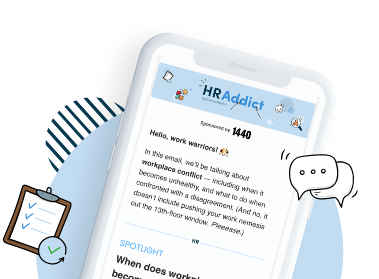This guest post includes sponsored content by Cleveland State University.
You can’t yoga your way out of a broken healthcare system. Sure, companies love to throw buzzwords around “resilience,” “employee engagement,” and “wellness Wednesdays.” Still, if you’re trying to retain talent in 2025, kombucha on tap won’t cut it.
Your secret weapon? Real, accessible healthcare. Employees quit for less stress, better work-life balance, and more meaningful benefits. Healthcare access is no longer a perk but a must.
If HR wants to boost retention and attract top-tier talent, it’s time to think beyond gym discounts.
TABLE OF CONTENTS
The healthcare-retention link: stronger than you think
Let’s start with the facts: Employees who feel their health and well-being are prioritized are more likely to stay.
According to PeopleKeep’s 2024 Employee Benefits Survey, employees rate healthcare as the most important benefit, with a 92% vote.
Healthcare access is directly tied to workplace productivity, attendance, morale, and yes, retention. But it’s not about premiums or dental plans. It’s about how and when your people can access quality care.
Employees today feel more pressure than ever, muddling through hybrid work models, caregiving responsibilities, and rising healthcare costs. When companies step up with reliable, easy-to-navigate healthcare options, they send a powerful message: “We see you. We’ve got you.”
More than a benefit, healthcare becomes a trust-building tool. It reassures employees that their needs matter beyond the bottom line.
That kind of assurance is priceless in an age where job hopping is normalized and loyalty is earned, not assumed.
What employees want
Hint: It’s not higher pay.
In the same survey from PeopleKeep, the top benefits employees value are healthcare, dental insurance, and vision insurance —all of which are medical benefits.
Of course, salaries are still important. However, in a post-pandemic world, people are re-prioritizing health and stability over high-stress, high-salary roles.
Many employees are now making career decisions based on how well a company supports their life outside of work. So it's no surprise that most of them look for companies that offer a generous health plan, mental health coverage, and family-inclusive care options.
Benefits that acknowledge the complexity of modern life will signal to your workforce that their employer understands the realities they face.
Workers are now more informed and selective. They read the fine print in benefit plans. They compare coverage, provider access, and out-of-pocket costs.
If your offerings don’t stack up, they won’t stick around. The takeaway? Healthcare access isn’t a secondary benefit but a key decision factor for talent retention and attraction.
On-site and near-site clinics: HR’s best-kept secret
One of the most powerful tools in HR’s arsenal? On-site or near-site health clinics.
These aren’t reserved for big corporations anymore. Businesses of all sizes are investing in workplace health services to increase access, reduce absenteeism, and create a culture of care.
How? Near-site health clinics remove key barriers to care: distance, time off work, and long appointment waits.
Staff no longer have to choose between a paycheck and a check-up. And when healthcare is embedded into the fabric of your workplace, it sends a clear message: “We value your health, not just your output.”
Mental health: The elephant in the break room
We can’t ignore the mental health crisis looming over the workplace.
The World Health Organization reports that anxiety and depression cost the global economy $1 trillion annually in lost productivity. And yet, too many companies treat mental health like a PR campaign, not a policy priority.
Meaningful mental health access means:
- Coverage for therapy and counseling
- Employee Assistance Programs (EAPs) that are easy to access
- Managers are trained to spot signs of burnout
- A culture that allows people to ask for help without fear of stigma
Retention isn’t just about keeping employees on the payroll, but ensuring they are healthy enough to want to stay.
Family matters: Supporting the sandwich generation
A growing number of employees juggle careers, children, and aging parents. They’re part of the so-called “sandwich generation,” and they need more than sympathy; they need supportive healthcare policies.
Meet the Family Nurse Practitioner (FNP). Their nursing career spans basic nursing practice and clinical practice. These skilled professionals are uniquely trained in family care programs to provide primary care across the lifespan, from disease prevention to health assessments.
FNPs are registered nurses (RNs) with additional certification and license, typically achieved through family NP online programs. The coursework allows registered nurses to complete their degree online, minus the commute to campus.
FNPs deliver patient care in private and group interdisciplinary settings, thanks to their collegiate nursing education background.
In a workplace setting FNPs can staff or manage on-site/near-site clinics and offer preventive care, health education, and chronic disease management. Their family-centered approach aligns with the varied needs of employees in terms of healthcare.
The ROI of healthier employees
Still need convincing? Consider this:
The investment doesn’t have to be massive. Small shifts like integrating telehealth services or introducing part-time FNPs can make a measurable difference.
What’s more, healthier employees mean fewer sick days, lower insurance costs, and better engagement across departments.
When people feel physically and mentally supported, they bring more focus, energy, and creativity to the job. They collaborate, manage conflict more effectively, and are less likely to mentally check out.
It also enhances your employer brand. Word travels fast, especially on platforms like Glassdoor and LinkedIn. If your employees consistently feel cared for, that becomes part of your public reputation and makes it easier to attract new talent.
Companies are fighting for every edge, and health-driven HR strategies deliver tangible ROI. Think of healthcare access not as an expense, but as an investment in your organization’s long-term resilience.
Work-life balance is a healthcare issue
We sometimes treat work-life balance as a scheduling problem. Nonetheless, it’s a healthcare issue.
Poor work-life balance has long been associated with increased stress-related illnesses.
Chronic stress is known to lead to hypertension and burnout, which eventually results in absenteeism and turnover. When employees have:
- Access to flexible care appointments
- Health professionals who understand family and work dynamics
- Preventative services that fit into their lives
...they don’t only feel better. They work better. And they stick around.
Rethinking retention: Beyond ping-pong tables
Yes, it’s easy to get caught up in flashy perks. However, real retention isn’t about snacks or swag. It’s about trust and support.
When employees feel safe accessing healthcare, taking a mental health day, or managing chronic conditions without judgment, they’re more likely to stay loyal. They become not workers, but brand ambassadors.
Being an HR professional puts you in the ideal position to lead the conversation. Advocate for better care. Partner with your benefits provider. Introduce FNP-led health solutions.
Make your workplace the one where people feel seen, supported, and healthy enough to thrive. And let’s be real. Retention strategies that work in 2025 are about care over cool.
Employees will trade office ping-pong for proactive healthcare any day. A foosball table doesn’t help when you’re managing chronic pain. A smoothie bar won’t reduce the stress of finding mental health support for your teenager.
What does help? Knowing your employer has your back when it counts.
Modern workers are savvy. They know when a company is masking a culture problem with trendy perks. Genuine healthcare support says, “You’re not just a cog in the machine; we care if you’re OK.”
In a job market where skilled professionals have options, showing up for your team in this way isn’t a kind gesture. It’s a competitive edge.
Health is the new loyalty program
Retention is a continuous process. It’s strengthened every time an employee schedules a check-up without fear of losing pay. Every time they access a therapist without shame, and every time they feel like their employer values them, not their timesheet.
Better healthcare access isn’t a moral imperative; it’s your best strategic move. When you lead with care, you nurture a sense of loyalty that no signing bonus can replicate.
Employees want to feel that they matter, like their needs, welfare, and their futures are part of the business equation. A thoughtful healthcare strategy sends that message loud and clear.
Investing in healthcare signals long-term commitment. It’s the difference between a revolving door of talent and a stable, engaged workforce. That’s your superpower in a competitive hiring landscape.
Don’t forget that empathy goes a long way. Sometimes, walking a mile in someone else’s shoes equips you better to show up when your team needs you the most. And that is worth more than a pat on the shoulder or a salary hike.
Go ahead, HR leader: Make healthcare your secret weapon. Your team and your bottom line will thank you for it.

